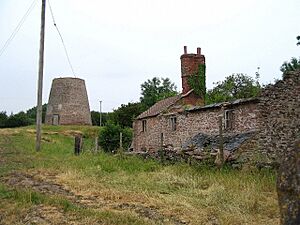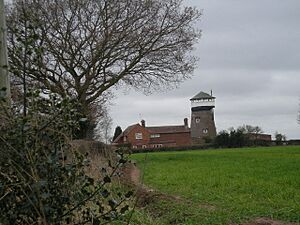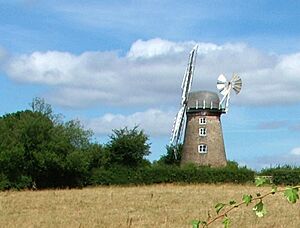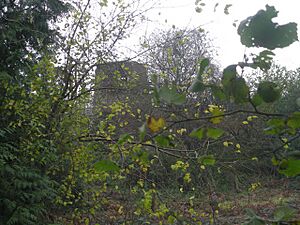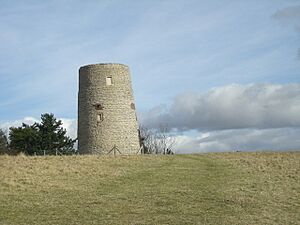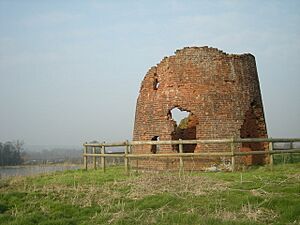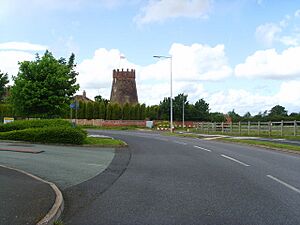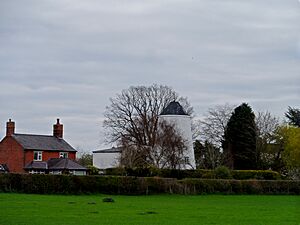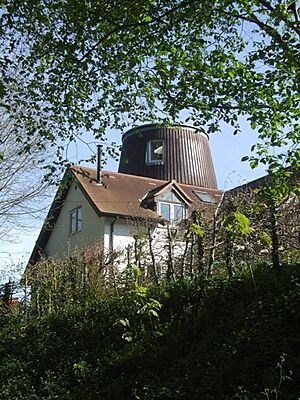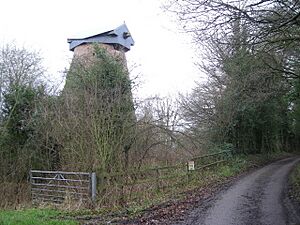List of windmills in Shropshire facts for kids
Windmills are amazing old machines that use the power of the wind to do work, like grinding grain into flour. This article is a list of windmills found in Shropshire, a county in England. Many of these windmills are no longer standing, but their history tells us a lot about how people lived and worked long ago.
Contents
Windmills in Shropshire: A Cool History
Windmills were super important before electricity. They used giant sails to catch the wind, turning big stones inside to grind wheat, pump water, or even saw wood. Shropshire, with its open spaces, was a great place for these windy giants!
What are Windmills?
Imagine a tall building with huge blades, like airplane wings, spinning in the wind. That's a windmill! They were built to harness the natural power of the wind. This power would then turn machinery inside, usually to grind grain into flour for bread.
Different Kinds of Windmills
There were a few main types of windmills:
- Post mills: These were some of the earliest windmills. The whole top part of the mill, including the machinery and the sails, could turn around a central post. This allowed the miller to point the sails into the wind no matter which way it was blowing.
- Tower mills: These were usually taller and stronger. Only the cap (the roof) and the sails at the very top would turn. This meant the main building stayed still, making them more stable and able to hold heavier machinery. Many of the windmills in Shropshire were tower mills.
- Wind engines: Later on, smaller metal windmills, called wind engines, were used. They often had many blades and were great for pumping water on farms.
Famous Windmills of Shropshire
Shropshire was home to many windmills. Here are some of the most interesting ones:
Alberbury: Rowton Mill
In Alberbury, you could find the Rowton Mill, also known as Sunny Bank Mill. This was a tower mill first mentioned in 1774. It's a great example of how these mills were built to last.
Albrighton Mill
The Albrighton Mill in Albrighton was another tower mill. It was first recorded in 1768. Imagine the sound of its sails turning as it ground grain for the local community!
Asterley: Westbury Road Mill
Near Asterley, the Westbury Road mill was a tower mill that started working around 1809. It's a reminder of how important these mills were for everyday life in the early 1800s.
Ditton Priors: Hillside Mill
The Hillside Mill in Ditton Priors was a tower mill that was active from at least 1845 until 1883. It stood on a hillside, perfect for catching the wind!
Much Wenlock Mill
The Much Wenlock Mill in Much Wenlock was a tower mill that existed from at least 1714. It was a very old mill, showing how long windmills have been a part of Shropshire's history.
Shifnal: Upton Mill
In Shifnal, the Upton Mill was a tower mill. Even though it's not fully standing today, its remains tell a story of its past importance.
Telford: Hadley Park Mill
The Hadley Park Mill in Telford was a tower mill that started around 1787. It's sometimes called "Hadley Park Castle" because of its strong, castle-like appearance.
Wem: Cotonwood Mill
Near Wem, the Cotonwood Mill was a tower mill built in 1813. It served the local area for many years.
Westbury: Vennington Mill
The Vennington Mill in Westbury was a tower mill that was active in 1808. It's another example of the many windmills that dotted the Shropshire landscape.
Weston-under-Redcastle: Hawkstone Mill
The Hawkstone Mill in Weston-under-Redcastle was a tower mill from 1808. It's a great example of a derelict (abandoned) windmill, showing the passage of time.
Windmills That Helped Out
Some windmills were not just for grinding grain. For example, in Broome and Lydbury North, there were "Titt iron wind engines" built around 1895-1896. These were special metal windmills, often used for pumping water on farms.
Maps That Show Windmills
Historians and mapmakers have been drawing windmills for centuries! Old maps like those by John Rocque (1752), Baugh (1808), and the Ordnance Survey (1832, 1833) help us know where these windmills once stood. They are like treasure maps for history detectives!
Images for kids
 | Kyle Baker |
 | Joseph Yoakum |
 | Laura Wheeler Waring |
 | Henry Ossawa Tanner |


